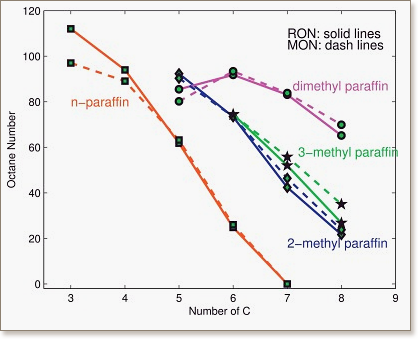Impact of fuel molecular structure on auto-ignition behavior – Design rules for future high performance gasolines


At a first glance, ethanol, toluene and methyl tert-butyl ether look nothing alike with respect to their molecular structures. Nevertheless, all share a similarly high octane number. A comprehensive review of the inner workings of such octane boosters has been long overdue, particularly at a time when feedstocks for transport fuels other than crude oil, such as natural gas and biomass, are enjoying a rapidly growing market share.
As high octane fuels sell at a considerable premium over gasoline, diesel and jet fuel, new entrants into the refining business should take note and gear their processes towards knock resistant compounds if they are to maximize their respective bottom lines. Starting from crude oil, the route towards this goal is well established. Starting from biomass or natural gas, however, it is less clear what dots on the horizon to aim for.
The goal of this paper is to offer insight into the chemistry behind octane boosters and to subsequently distill from this knowledge, taking into account recent advances in engine technology, multiple generic design rules that guarantee good anti-knock performance.
Careful analysis of the literature suggests that highly unsaturated (cyclic) compounds are the preferred octane boosters for modern spark-ignition engines. Additional side chains of any variety will dilute this strong performance. Multi-branched paraffins come in distant second place, owing to their negligible sensitivity. Depending on the type and location of functional oxygen groups, oxygenates can have a beneficial, neutral or detrimental impact on anti-knock quality.

"KAUST shall be a beacon for peace, hope and reconciliation, and shall serve the people of the Kingdom and the world."
King Abdullah bin Abdulaziz Al Saud, 1924 – 2015
Thuwal 23955-6900, Kingdom of Saudi Arabia
© King Abdullah University of Science and Technology. All rights reserved